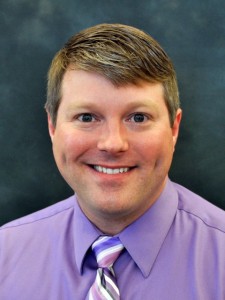We recently caught up with Josh Kirby, lead faculty member for Learning, Design, and Technology (LDT) online programs at Penn State. Here’s our conversation:
Please give our readers a sense of your background and how you arrived at your current position at Penn State.
I’m new to my role as the lead faculty member for LDT online programs at Penn State, but when I began my employment in this role in February 2015 I was returning to a university and faculty that I know and respect. From 2001 to 2007 I was a master’s and doctoral student

at Penn State University Park, in the instructional systems program. From 2007 to 2010 I was the instructional design coordinator for online programs at the Penn State School of Graduate Professional Studies at Great Valley. I coordinated the efforts of the engineering faculty at Great Valley, converting their initial concepts for a systems engineering master’s degree into a successful and well-ranked program. Following Penn State Great Valley, my spouse and I hopscotched to Ohio and Wyoming, and then back to Pennsylvania for career opportunities in our respective areas of expertise. By training and by interest, I am an educational programs administrator — I like to design, deliver, and administrate educational programs, as it fits well with my instructional systems background and my personal desire to always be in the thick of things.
Can you explain what a degree in Learning, Design and Technology entails?
Our master’s degree (MEd) in Learning, Design and Technology prepares students to be critical evaluators and decision-makers related to educational technologies and learning resources. We attract a broad range of educators, including K–12 teachers, corporate/organizational/military trainers, curriculum developers, instructional designers, and higher education personnel. We aim to produce skilled professionals who will understand design and development processes, evaluate the qualities of technologies and resources for learning, and relate those qualities to their organization’s educational goals.
The LDT MEd degree program features courses in systematic instructional development, instructional development for course management systems, educational game design, integration of mobile technologies into learning contexts, as well as a few courses to expose students to current trends and foundations in the design of technology for learning. Our students gain both practical skills as well as a deeper understanding of the field, its history, and its trends. Our course selection is tailored to not only prepare students for work in today’s learning design field, but also to help them adapt to the world of constant innovation in educational technology.
What do you believe are some of the best qualities of the Learning, Design and Technology program offered by Penn State World Campus?
I am most proud that the faculty teaching our online courses are the same faculty who are teaching the residential courses for doctoral and master’s students at University Park, who are actively engaged nationally and internationally in the research of learning design and educational technology, and who — despite their professional successes — are committed parents, community members, and friends. Our students notice the quality of our faculty from the beginning of their studies. When teaching, regardless of venue, the LDT faculty members are knowledgeable and principled, and they have high expectations for themselves and their students.
I also appreciate that our program continues to grow and evolve in sync with the fields of LDT as a whole. Our Postbaccalaureate Certificate in Educational Technology Integration continues to be extremely popular, attracting students who are looking for that mid-career boost to their understanding of a dynamic educational landscape, as well as students who aren’t quite sure they want to jump feet first into a master’s degree program. (By design, if you complete the certificate, all five courses will transfer directly into the MEd in LDT program. More than half of our MEd students started as certificate students.) Given the success of our certificate in educational technology integration, we have additional specialized certificates currently in the approval process, helping to ensure that we are meeting the needs for many different education, training, and design professionals.
What do you think is the most important consideration when developing an online course?
Online course materials need to facilitate the learning processes of many different people and preferences. If the course is active, with interesting hands-on projects and collaborative explorations, then the course will appeal to a broad array of learners. But I do not discount the importance of theoretical and historical foundations, especially for advanced learners (like graduate students in higher-education settings). If we can find meaningful readings, substantive multimedia resources, and engaging projects and blend them together in a way that has a palpable flow, then we will have a good course. Possibly the most important consideration when designing an online course is iteration — version 1 of the course will not be as good as versions 2 or 3, so design processes (and educational systems) must incorporate additional time for revision after the first run of a course.
What have you learned from teaching World Campus students?
I appreciate the extraordinarily broad range of student experiences and circumstances that bring them to pursue higher education with us. Some are finally getting the chance to further their education after years away from their past educational experiences. Others need the flexibility to do what they need to do at home with their families, or on the road with their careers. We have teachers looking for their first master’s degree as a requirement for their teaching license, and teachers looking for their second master’s degree as a means to enhance or change their career path in education. We have military students learning about LDT because it directly relates to their military missions, and some who seek a new opportunity for the next stage of their careers after active duty.
What I have learned is that we need to be broad in our awareness, but focused on delivering the best content and learning experiences to our students. The students chose Penn State because of the quality and reputation of our online learning opportunities offered by World Campus, and because of the national and international regard that has been earned by each academic program, my program included. We have a responsibility to deliver the best resources, the best practices and perspectives, and the best efforts of our field and our faculty to those who trust us enough to place (to some extent) their careers into our hands. My World Campus students have made me strive to be better myself, and to lead my peers toward continuous innovation and improvement. My constant contact with students who I teach and who I advise provides me with an ongoing source of motivation that I can use to fuel the thinking of myself and my colleagues.
What do you do for fun?
My spouse and I recently welcomed our first child to our world, so my fun of late has been moments of joy followed by hours of household tasks to care for the others. If there is ever to be a “new normal” to be had in the near future, then I will return to my outdoor travels, particularly hiking, backpacking, and canoeing. Of all the things that I can give to my child, a deep understanding of our connection to the natural world tops the list, and fun things like an aptitude for digital technology and science can come later. I continue to serve as a volunteer with the Boy Scouts of America at the local, area, and national levels of leadership in that organization —where I have a deep-seated love for advising youth (ages 14 through 20) who are elected officers at each of those local, area, and national levels. While at home I enjoy cooking and preparing great meals and learning from those failures and successes — I was on a substantial “success” streak, but that streak was recently broken by a very bad recipe (from a published cookbook, no less).
To learn more about the Learning, Design, and Technology MEd and certificate programs, please contact Dr. Kirby at edtec@psu.edu or call the online programs’ office at 814-865-0473.



